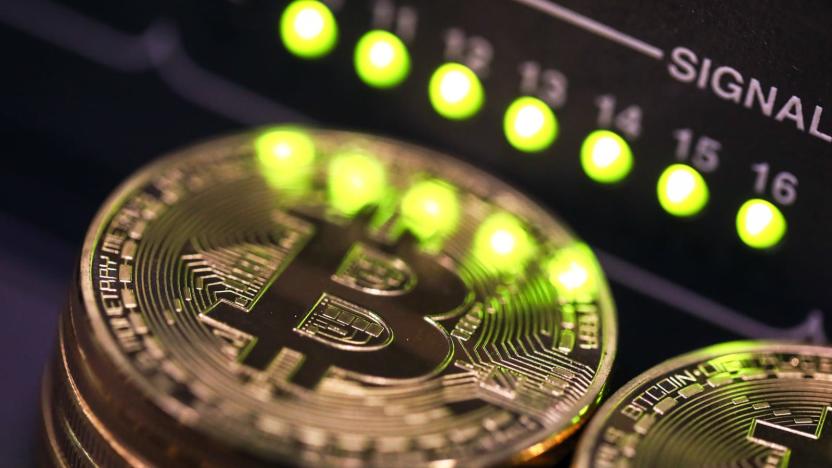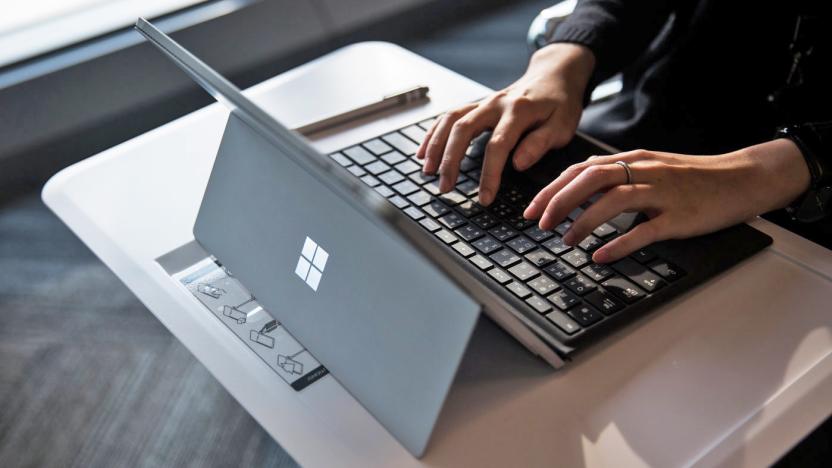currency
Latest

China might shut down the country's bitcoin exchanges
China has never been a fan of digital currencies like bitcoin, and now the country appears bent on a major crackdown. In the wake of China's recent ban on initial coin offerings (where you raise funds for a new cryptocurrency), Wall Street Journal sources understand that Chinese officials are ordering the shutdown of domestic bitcoin exchanges. The timeline isn't clear -- one says the closure decision had already been made, while another heard the process would take "several months." If the scoop is accurate, however, the motivations are clear.

AMD and NVIDIA go after Bitcoin miners with new video cards
Dedicated digital currency miners know the importance of good graphics cards -- modern GPUs have enough general-purpose computing power to process money formats like Bitcoin much faster than a CPU alone. They've never really been suited for non-stop number crunching, though, and it looks like both AMD and NVIDIA hope to change that. CNBC has discovered that ASUS is making currency mining-oriented video cards using both vendors' chipsets. The AMD-based Mining RX 470 and NVIDIA-based Mining P106 are ultimately using off-the-shelf GPUs (the RX 470 and GTX 1060 respectively), but are fine-tuned for running around the clock.

Bitcoin is worth more than ever, but it's losing clout
To say that Bitcoin has had a roller coaster ride would be an understatement. Between regulatory hurdles, heists and its all-too-common use in online crime, it's sometimes a surprise the cryptocurrency has survived. However, it's faring well -- so well, in fact, that the value of a coin just topped $2,000 US for the first time. While it's mostly a symbolic milestone, it reflects confidence stemming from regulation (particularly in big Bitcoin markets like China and Japan) and a rapid rise that saw its value soar hundreds of dollars in a matter of weeks.

South Korea tests prepaid cards to replace pocket change
Coins are a pain in more ways than one. You probably don't like fishing for change, of course, but they're also expensive to make (the US loses money on every penny) and require mining that hurts the environment. Wouldn't it be good to get rid of coins altogether? South Korea is trying just that. The country is starting a trial that could lead to a coinless society. As of April 20th, shoppers at several stores (Seven Eleven, CU, E-Mart, Lotte Mart and Lotte Department Store) can deposit their change into mobile and prepaid cards. If you need to pay with cash, you can stick with paper notes instead of lugging around coins that you're unlikely to use all that often.

Russia hopes legitimizing Bitcoin will thwart crooks
Russia's existing stance on bitcoin and other digital currencies is... less than welcoming. You could face website bans and prison time just for using it. However, the country is making an about-face on the idea. Deputy Finance Minister Alexey Moiseev tells Bloomberg that Russia hopes to recognize cryptocurrencies in 2018. Officials still have to determine how they will categorize this virtual money (assets? Cash? Securities?) sometime in mid-2017, but it's now more a question of "when" than "if." Of course, this isn't a purely benevolent move -- it's really about cutting back on crime.

Canada hid the Konami Code in its commemorative $10 bill launch
Canada's currency is already the world's dorkiest, with its plastic material, transparent windows and holograms everywhere. For a $10 bill celebrating the nation's 150th anniversary, however, the Bank of Canada outdid itself with an Easter egg on its website that rewards visitors with (a dorky version of) the national anthem and a shower of tens down the screen. The best part is that to get it, you punch in the "Konami Code" first made famous in Konami's 1986 Contra NES game.

Bitcoin wallets get a key approval in Switzerland
Bitcoin companies offering virtual wallets sometimes face a difficult legal question: do they have to operate as a bank (with all the regulation that entails), or can they function as something else? In Switzerland, at least, that matter is settled. Xapo has received "conditional approval" for running its bitcoin wallet service from the country. It'll have to participate in a self-regulatory organization and meet other unspecified terms, but it won't have to secure a banking license. As of now, it's classified as a financial go-between.

Swiss rail stations will sell bitcoins at ticket machines
Switzerland is stepping up its bitcoin fascination in a big way. Railway operator SBB (with the help of SweePay) is launching a 2-year trial for a service that lets you exchange Swiss francs for bitcoin at any of the company's ticket machines in the country. Scan a QR code with your phone and you can get between 20 to 500 francs ($20 to $505) of digital currency at any time. If you want to go shopping without using cards or physical cash, you can do it right after you leave the train station.

Bitcoin mining just became less rewarding, on purpose
If you have computers chugging away as bitcoin mining machines, don't be surprised if your output just fell through the floor. Reuters notes that code built into the digital currency system has cut the mining reward in half as of July 9th. Where there were previously 25 bitcoins (roughly $16,000) to be mined every 10 minutes, you now have to fight over 12.5. The measure automatically kicks in every four years as part of an attempt to curb inflation that would come from both a growing number of miners and ever-faster computers.

Cryptocurrency raider takes $60 million in digital cash
A cryptocurrency is only as reliable as the technology that keeps it running, and Ethereum is learning this the hard way. An attacker has taken an estimated $60 million in Ethereum's digital money (Ether) by exploiting vulnerabilities in the Decentralized Autonomous Organization, an investment collective. The raider took advantage of a "recursive call" flaw in the DAO's code-based smart contracts, which administer the funds, to scoop up Ether many times in a single pass.

Bitcoin will pay for public services in a small Swiss town
Most experiments in paying with digital currencies have come from private companies, but the Swiss town of Zug is trying something different. As of July 1st, the community is launching a trial that will let you pay for public services using Bitcoin -- as long as you're shelling out the equivalent of 200 francs ($206 US) or less, you can skip old-fashioned money. The trial will run through the rest of 2016, though whether or not it lives beyond that depends on the town council's findings.

Microsoft no longer takes Bitcoins in its Windows app store (update)
Microsoft's grand experiment in accepting Bitcoins as payment hasn't panned out, it seems. The company has quietly updated its FAQ to reveal that it no longer accepts the digital currency in the Microsoft Store on Windows 10 devices. You can use an existing balance to buy your apps, but you can't supply more Bitcoins or get a refund. Like it or not, you'll have to use conventional money from now on.

PayPal's redesigned mobile app makes money transfers easier
If you're a fan of sending money with PayPal while on the go, a new version of the company's mobile app aims to make the task easier. As you might expect, handling transactions is the most popular task for the software, and the redesign makes those controls the main attraction. The home screen now shows recent transactions, recent contacts and allows you to quickly resolve any pending requests. In fact, separating transactions based on what's pending and what's completed is a welcome change that should make keeping tabs on your finances a bit easier. It's also easier to pay for things like Yelp Eat24 orders with the app. For Android users, PayPal says it improved fingerprint scanning for more devices, too.

Winklevoss twins get approval to run their bitcoin exchange
After several months of waiting, the Winklevoss twins (they who claim to have invented Facebook) have the all-clear to run their Gemini bitcoin exchange. New York state's Department of Financial Services has granted a license to Gemini that lets it run as a chartered trust when it launches on October 8th. This doesn't make it a full-on bank, but it'll have the authority to accept deposits, make loans and serve as an agent for the government across 26 states and Washington, DC. All told, this takes bitcoin one step closer to legitimacy -- important when the virtual currency world still tends to be defined by scandals. [Image credit: Noam Galai/Getty Images for TechCrunch]

Bitcoin Ponzi scheme operator pleads guilty to fraud
Digital currencies like bitcoin are still marking many firsts, and that unfortunately includes the first crimes. Case in point: Trendon Shavers has pleaded guilty to the first-ever US securities fraud charges involving bitcoin. The Texan was accused of operating a Ponzi scheme that swiped more than $4.5 million from investors. He promised enormous returns on investment (a whopping 3,641 percent per year) to those who helped fund a stock market campaign, but was really using the money from newer customers to pay existing ones. To no one's surprise, this deception didn't last long. Nearly half (48) of the 100 investors suffered losses, and Shavers even used $147,000 of their funds to buy himself luxuries like a BMW M5 sedan.

Winklevoss twins get closer to launching their bitcoin exchange
You may still think of the Winklevoss twins as those guys who claimed to have invented Facebook, but they've just taken a big step toward making their names in the digital currency business. The two have filed a New York trust application necessary for them to launch their Gemini bitcoin exchange. The move won't put Gemini on the same level as a bank if it's approved, but it will let the exchange accept deposits, issue loans and serve as an agent for government institutions.

Bitcoin miners create invalid currency after a botched upgrade
Digital currencies are only as reliable as their software, and some Bitcoin users are learning this the hard way. Thanks to a "problem" with an upgrade that applies a new rule, some Bitcoin mining pools (namely, those that don't usually wait to validate their money) have been generating invalid data blocks. If you're using certain client apps, that could lead to making transactions that aren't really valid -- and mining operations that ran afoul of the change are losing income.

MasterCard Send is a new way to distribute funds quickly
Let's face it: checks aren't convenient. If you're using them to pay for something, there's all the extra writing and mailing. If you're receiving them, there's a whole process for getting them into your account. Well, MasterCard says it solved the convenience issue with Send: a new system that allows businesses and individuals to securely exchange funds in minutes. This means that you'll no longer have to wait for a check to clear or for the transfer to go through. While businesses looking to send refunds, claims payments and rebates are a key focus, MasterCard is letting regular folks leverage the system to send money to friends and family, too. What's more, you don't have to be one of its customers to opt in, and you can use Send to pay for goods at participating retailers.

Someone's built a bitcoin-like system for real gold
There's no short, elegant way to describe bitcoin, but if you put a gun to our heads, we'd say that it was digital gold. That's because the cryptocurrency is based on a limited quantity of a resource that is then used as a method of exchange. Unfortunately, bitcoin's popularity within the high-minded financial sector has grown to such an extent that honest-to-goodness real gold is getting in on the act. BitGold (yup) is the brainchild of Toronto-based Roy Sebag, who has cooked up a digital payments platform that connects real-world vaults with online customers.

Facebook faces another class-action suit, this time over kids' purchases
Facebook isn't exactly a stranger to the courtroom, but it'll soon have another legal headache to deal with thanks to a recent court ruling out of San Jose, California. You see, US District Court Judge Beth Labson decided on Tuesday that in spite of the company's best efforts, Facebook will have to deal with a brewing class action lawsuit involving kids, credit cards and the company's long-dead virtual currency.




